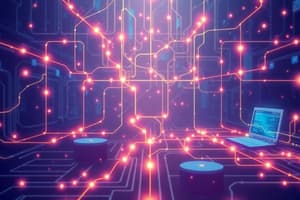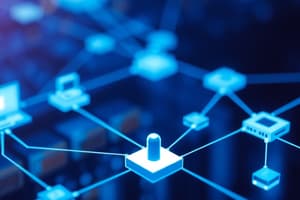Podcast
Questions and Answers
Which type of network is typically suitable for connects computer in a single office or home or office?
Which type of network is typically suitable for connects computer in a single office or home or office?
- LAN (correct)
- MAN
- PAN
- WAN
What is a key characteristic of a Mesh topology?
What is a key characteristic of a Mesh topology?
- Each device connects to a central hub.
- All devices share a single communication line.
- Data travels in a circular path between devices.
- Each device connects to multiple others for redundancy. (correct)
Which protocol is primarily used for secure web page transfers?
Which protocol is primarily used for secure web page transfers?
- HTTP
- SMTP
- HTTPS (correct)
- FTP
What is the primary function of a router in a computer network?
What is the primary function of a router in a computer network?
Which of the following is true of IPv6 addresses compared to IPv4 addresses?
Which of the following is true of IPv6 addresses compared to IPv4 addresses?
What is a common application of computer networks?
What is a common application of computer networks?
What role do firewalls play in network security?
What role do firewalls play in network security?
What distinguishes a WAN from a LAN?
What distinguishes a WAN from a LAN?
Flashcards are hidden until you start studying
Study Notes
Computer Networks
-
Definition: A computer network is a collection of computers and devices interconnected to share resources and communicate.
-
Types of Networks:
- LAN (Local Area Network):
- Small geographic area (e.g., home, office).
- High-speed connectivity.
- WAN (Wide Area Network):
- Covers large geographic areas (e.g., cities, countries).
- Slower compared to LAN; often uses leased telecommunication lines.
- MAN (Metropolitan Area Network):
- Connects networks within a specific metropolitan area.
- Larger than LAN but smaller than WAN.
- PAN (Personal Area Network):
- Very short range, typically within a few meters (e.g., Bluetooth devices).
- LAN (Local Area Network):
-
Network Topologies:
- Star: Central node with connected devices; easy to manage but vulnerable to central node failure.
- Bus: All devices share a single communication line; easy to set up but limited by cable length and traffic.
- Ring: Each device connected to two others, forming a circle; data travels in one direction.
- Mesh: Each device connects to multiple others; highly reliable but expensive to set up.
-
Protocols:
- TCP/IP (Transmission Control Protocol/Internet Protocol): Foundation of internet communication; breaks data into packets for transmission.
- HTTP/HTTPS (Hypertext Transfer Protocol / Secure): Used for transferring web pages; HTTPS provides encryption.
- FTP (File Transfer Protocol): Protocol for transferring files between computers.
- SMTP (Simple Mail Transfer Protocol): Protocol for sending emails.
-
Network Devices:
- Router: Directs data packets between networks; connects different networks.
- Switch: Connects devices within a LAN; manages data traffic efficiently.
- Modem: Modulates and demodulates signals for internet access; connects home networks to the ISP.
- Access Point: Extends wireless network connectivity to devices.
-
IP Addressing:
- IPv4: 32-bit address format; provides ~4.3 billion addresses.
- IPv6: 128-bit address format; designed to replace IPv4 and accommodate more devices.
-
Network Security:
- Firewalls: Monitors and controls incoming/outgoing network traffic.
- Antivirus Software: Protects devices from malware and viruses.
- Encryption: Secures data transmission over networks.
-
Applications of Computer Networks:
- File sharing and collaboration tools.
- Streaming services (audio, video).
- Online gaming and social media platforms.
- Cloud computing services for storage and processing.
-
Emerging Technologies:
- IoT (Internet of Things): Interconnected devices for data sharing (e.g., smart home devices).
- 5G Networks: Next generation mobile networks offering faster data speeds and increased capacity.
Computer Networks Definition
- A computer network is a group of interconnected computers and devices that share resources and communicate.
Network Types
- LAN (Local Area Network): Covers small areas like homes or offices, offering high-speed connectivity
- WAN (Wide Area Network): Spans large geographic areas like cities or countries, using leased telecommunication lines for slower connectivity compared to LANs
- MAN (Metropolitan Area Network): Connects networks within a city or metropolitan area, larger than LANs but smaller than WANs
- PAN (Personal Area Network): Covers very short ranges, typically within a few meters, used for devices like Bluetooth connections
Network Topologies
- Star Topology: Features a central node with connected devices, offering easy management but vulnerability to central node failure
- Bus Topology: Uses a single shared communication line for all devices, easy to set up but limited by cable length and traffic congestion
- Ring Topology: Each device connects to two others, forming a circular network, data travels in one direction
- Mesh Topology: Every device connects to multiple others, highly reliable but expensive to set up
Network Protocols
- TCP/IP (Transmission Control Protocol/Internet Protocol): Forms the foundation of internet communication, breaking data into packets for transmission
- HTTP/HTTPS (Hypertext Transfer Protocol / Secure): Used for transferring web pages, HTTPS provides encryption for security
- FTP (File Transfer Protocol): Used for transferring files between computers
- SMTP (Simple Mail Transfer Protocol): Used for sending emails
Network Devices
- Router: Directs data packets between networks, connecting different networks
- Switch: Connects devices within a LAN, managing data traffic efficiently
- Modem: Modulates and demodulates signals for internet access, connecting home networks to the ISP
- Access Point: Extends wireless network connectivity to devices
IP Addressing
- IPv4: Uses a 32-bit address format, offering approximately 4.3 billion addresses
- IPv6: Uses a 128-bit address format, designed to replace IPv4, allowing for a much larger number of addresses
Network Security
- Firewalls: Monitors and controls incoming and outgoing network traffic
- Antivirus Software: Protects devices from malware and viruses
- Encryption: Secures data transmission over networks
Applications of Computer Networks
- Enable file sharing and collaboration tools
- Power streaming services for audio and video content
- Support online gaming and social media platforms
- Facilitate cloud computing services for storage and processing
Emerging Technologies
- IoT (Internet of Things): Connects devices to share data, enabling applications like smart home devices
- 5G Networks: Next generation mobile networks offering faster data speeds and increased capacity
Studying That Suits You
Use AI to generate personalized quizzes and flashcards to suit your learning preferences.




